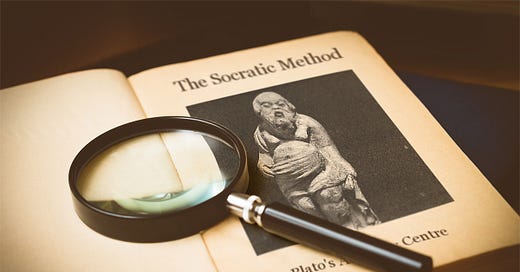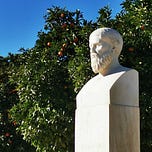This episode is part of the Plato’s Academy Centre course on the Socratic Method. In this lesson, we will be learning about the role of civility in the Socratic Method. We’ll also begin looking at how Socrates coped with insults and how the concept of the “principle of charity” can help us preserve civility and reason in a debate.
Socrates' philosophical method appealed to reason, trying to get to the real truth rather than accepting the superficial appearance of truth. The Sophists, by contrast, were professional orators who dominated Greek education at the time. They typically persuaded audiences to agree with them by using rhetoric to appeal to their emotions. Although the Sophists sometimes sounded like they were talking about the same things as philosophers, Socrates thought theirs was a dangerously misleading approach, which distorted reason. He also made a sharp distinction between dialectic, the pursuit of truth by means of reason, and eristics, which means trying to win arguments for amusement or to look clever – like those who always want to be right.
Questions and Answers
Dialectic was also known as the “question and answer” method. The first change required, to genuinely get at the truth, was simple. No more long-winded speeches. Socrates felt the Sophists were being allowed to speak far too long. They needed someone to interrupt them and actually question the premises upon which their argument was supposedly built. A Spartan king once quipped after listening to a Sophist that he couldn't remember the start of his speech, so didn't understand the middle, and therefore couldn't agree with the conclusion.
Socrates likewise insisted that we should be concise and unambiguous in our speech, and critically evaluate our assumptions each step of the way. It's easy to be deceived if we allow ourselves or others to go on without pausing to question the assumptions made in our reasoning. Long speeches are entertaining, though, and interruptions every few minutes can feel tedious. Socrates realized that this needed to be done without any hint of hostility, otherwise it risked degenerating into a squabble. Sometimes he would even claim to have a bad memory, forcing an orator to pause so that he could question the assumptions made at the beginning of their speech.
Epictetus on Socrates
The famous Stoic teacher, Epictetus, was still urging his students to look first and foremost to Socrates as their role model in life, over five centuries after the latter's execution. It may surprise you to learn that Epictetus didn't think it was Socrates' philosophical doctrines that his students were most in need of studying. Rather, it was his ability to tolerate disagreement over extremely important questions, such as the nature of justice, without getting into a heated argument.
Now this was the first and chief peculiarity of Socrates, never to be irritated in argument, never to utter any thing abusive, any thing insulting, but to bear with abusive persons and to put an end to the quarrel. – Discourses, 2.12
Epictetus says that when most people try to debate such lofty things they tend to confuse both themselves and the other person, get frustrated, argue, take offense, and then end up storming off in a huff. Socrates was adept, though, at getting people to examine their own assumptions. He never took offense at others, although occasionally they did become angry at his questions and insulted him.
Socrates on Coping with Insults
We're told that because Socrates sometimes questioned people too keenly, they were known to fly at him, punching him with their fists or even tearing his hair out. Although he was frequently "despised and laughed at", he bore their insults and even their physical assaults, patiently and with great temperance. Indeed, he is depicted by his friends as exhibiting tireless patience and courtesy.
Once, when a man became angry and kicked Socrates, an onlooker said he was shocked that the philosopher seemed unfazed by such abuse. Socrates replied that there was no more point getting upset at the angry man than at a donkey, if one had kicked him. His point is that the stranger who lost his temper didn't really understand what he was doing, and behaved like an animal lacking reason. So why get upset in response? That would make us no better than him.
On another occasion, Socrates was asked why he wasn't more offended at some outrageous insult. He replied simply that he chose not to take offense, reasoning that it needs two to make a quarrel. During Socrates’ lifetime, the playwright Aristophanes and other comic poets put on satirical plays, mocking him before all of Athens and countless foreign visitors. Socrates said he didn't mind because if they had genuinely pinpointed his faults, they'd be doing him a favour, whereas if their criticisms turned out to be groundless, they were of no consequence to him. We should follow his example, learn to be tolerant of disagreement, and refuse to take offense even at the worst insults. We gain nothing by doing so but merely harm ourselves.
Adopt the Principle of Charity
On social media people often comment on posts quickly and try to be brief, so their arguments often aren't expressed well. They tend to simplify their reasoning, leave their assumptions unstated, and make sweeping generalizations. It's good etiquette in a philosophical debate to assume a stance known as "the principle of charity" and this can be especially helpful online. It means giving people the benefit of the doubt, as we say, and placing the most favourable interpretation possible on their words, rather than jumping to a more negative conclusion. For instance, if someone were to say that "other philosophers admire Plato", it would be charitable to assume that they meant some philosophers rather than all of them. We can avoid a lot of unnecessary quarrels online by checking our understanding based on the most favourable interpretation: "Did you mean that some but not all philosophers admire Plato?"
Socrates typically helped his opponents in dialogue to clarify what they meant, even if this required considerable patience. Actively listening to others in this way, paraphrasing what we think they're trying to communicate, in order to make sure we've understood, can help both parties, and everyone else. It does take patience, though. Sometimes it's better simply to ignore comments if responding to them seems unlikely to help anyone. As Winston Churchill reputedly said, “You will never reach your destination if you stop and throw stones at every dog that barks.” If we're to expend more time and energy responding constructively, we have to learn to respond more selectively.
Socratic Questioning
Socrates did not typically appeal to what other people might say or think in order to persuade his partners in dialogue. He doesn't say "You should view things this way because that's what others say is true." Rather, he looks to the individual to stand on their own two feet, as it were, by rationally evaluating their own beliefs. Indeed, while he was awaiting execution, he reputedly wrote a poem about Aesop’s Fables, which began with the words:
"Judge not, ye men of Corinth," Aesop cried, "Of virtue as the jury-courts decide."
Socrates meant that we should never appeal to the opinion of the majority, as if they were a jury, when it comes to matters as important as the nature of virtue. We have to reason for ourselves.
Socrates tended likewise to avoid lecturing his companions didactically, as though he were an expert. Rather than telling them they're wrong, he preferred to ask questions, which forced them to acknowledge errors in their own thinking. He trusts them to realize when they've contradicted themselves rather than directly forcing his own opinion on them. His whole style of inquiry, therefore, embodies respect for the intellect of the individual with whom he's talking.
Let’s say, then, that you just want to get going. Here is the Socratic method in crude form: When someone makes a claim about right and wrong or good and bad, question it. Ask what the claim means, and about other things its holder believes, and look for tension between those points; show with your questions that the claim must in some way be unsatisfactory to the person who made it. In effect you deny what your discussion partners say, but the denial is artful. If you do this right, it won’t even sound like an argument. They will refine their claims, and now you do it again. – Ward Farnsworth, The Socratic Method
If you're interested in engaging in philosophical discussions, in a tolerant and constructive way, why not join our Plato's Academy Centre Facebook community? Or tag @PlatoAcademyCen on Twitter and use #Socrates to continue the conversion there.
Regards,
Donald Robertson
President of The Plato's Academy Centre
















Share this post